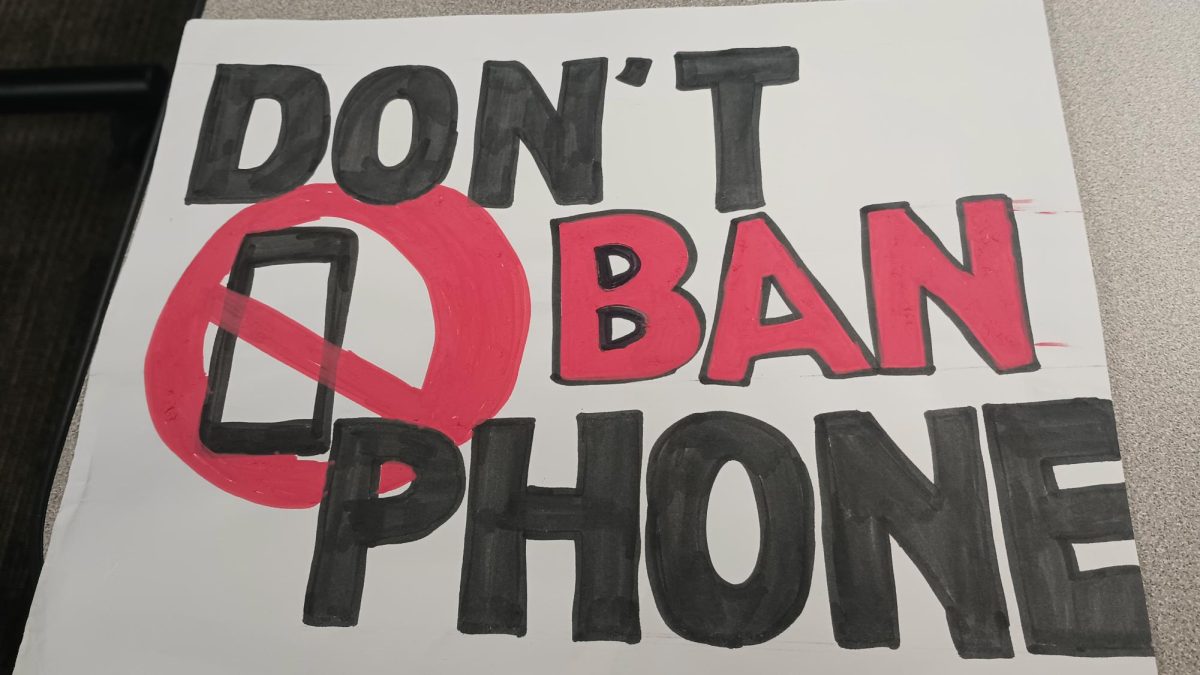You stay up late to complete an assignment which seems like a ritual every student has done. Your panicked thoughts overcloud any thought of getting a full eight hours of sleep due to the feeling of anxiety to finish the assignment. You are willing to sacrifice sleep, time, and your own mental health in order to stay on top of your academics. When you get to school and complain about your lack of sleep, you are met with your friend’s insistence that you can’t possibly be as tired as they are with their five hours of sleep. You also begin to wonder why your teacher has assigned you so much work and if they can see your suffering.
The idea that sacrificing oneself is needed in order to accomplish your goals has become a prominent belief amongst our society, especially with students and school faculty. This is known as self-sacrifice.
The Merriam-Webster dictionary defines self-sacrifice as the “sacrifice of oneself or one’s interest for others or for a cause or ideal.”
We have been raised believing that sacrifices have to be made to ensure success, and as a result, we have unintentionally cultivated an environment where we may develop a self-sacrifice schema. This may lead to unhealthy boundaries being set since we can no longer differentiate between productive sacrifices and unproductive ones.
When we don’t have healthy boundaries, an imbalance within ourselves begins to form which can lead us to suffer from self-neglect. We may begin to feel tired and negatively associate our helpful tendencies with these negative emotions which help no one.
Both students and school faculty struggle with balancing their busy work and social lives and having the burden of self-sacrifice lingering over their shoulders amplify unhealthy ways to cope.
Students
With that being said, this self-sacrificing mindset has been instilled into students everywhere with the reassurance that if we continue to push ourselves, we will be successful.
We are convinced that pushing ourselves into completing as many community service hours as possible and obtaining the best possible grades that we can in our courses is the key to happiness. Not only that but we are told that in order to get into the most prestigious and competitive schools, we should be involved with as many extracurricular activities as possible along with striving to be a leader in all of them in order to set ourselves apart from others.
I interviewed three students at MCHS to try to uncover how this self-sacrifice schema is impacting their academics and day-to-day life.
Junior, Paola Sanchez, was asked about what a typical Monday looks like for her.
“On Mondays, I wake up at 6:45 a.m., go to school, and then I go to Big Brothers and Big Sisters. Afterwards, I go home and do my necessities. Then I usually work on my Math, English and History homework and sleep at like 11…everyday is different,” Sanchez said.
The answer of every day being different is consistent with the idea that students have so many things that they need to juggle that no day is the same. Not only that, but there is also pressure for students to do things outside the classroom and sacrifice their own free time.
The reason why this pressure exists is due to the fact that top universities have had their acceptance rates decrease along with an increase in applicants every year. This means that these schools can no longer rely on only quantitative information like GPA and test scores but rather extracurriculars and community service.
This can then have an impact on students with low socioeconomic status since they are not able to take advantage of the extracurriculars and programs around them. The desperation of trying to do as much as possible increases when students realize that it seems like the only way to get into a prestigious university.
Junior, Oscar Hernandez, shared his perspective of whether he feels like he may be sacrificing too much of himself for his future.
“I used to. And then I realized just how much more I needed to sacrifice to get where I wanted to be and how much others already had sacrificed for me so I don’t really feel like that. What I see now as a big sacrifice is forging a future that I want, which is much better if I don’t sacrifice my all right now and lead a life of mediocrity,” Hernandez said.
The realization from students that they may need to sacrifice more in the future stems from the idea that sacrifice is tied with success that has been implanted since youth.
When students are not able to continue pushing themselves and keep up their sacrifices, a feeling of guilt may appear.
Junior, Denise Loaiza, shares her feelings about all of her responsibilities.
“I definitely want to go to university and get a higher education so when I don’t prioritize my homework or extracurricular involvement, I feel like I’m not doing my best. That’s one of the reasons I’d rather finish my work and sleep less than let my grade drop by going to sleep earlier and not finishing it,” Loaiza said.
The anxiety that ensues from feeling overwhelmed may result in feelings of anger and frustration to fall upon school faculty by students.
Hernandez shares his belief about whether school faculty try to understand or empathize with students who are stressed.
“Some of them take things on through a very rulebook kind of way and when they try to show their empathy, it comes off as you being a minor inconvenience that they can handle. Others are empathetic but they aren’t quick to show their empathy, they show it through small actions. Others come off as more sympathetic than empathetic but don’t do anything to help you,” Hernandez said.
Sanchez adds onto this belief of school faculty helping students.
“I think [school faculty] feel that school is supposed to stress students out. I think that there are some teachers who do empathize with students and are flexible,” Sanchez said.
Frustration with school faculty grows as students begin to believe that they aren’t cared for because of the lack of notice of how overwhelmed students are. This may ultimately lead to miscommunication between faculty and students with the divide among them growing.
School Faculty
While students are indeed impacted by the self-sacrifice schema, there is another side to this that is also impacted: school faculty.
It seems like there is a conception that in order to become a teacher, you have to be willing to make sacrifices.
Dr. Tiffany Carr, in her article “Is Sacrifice Needed to be a Good Teacher”, explains the many sacrifices that are synonymous with teachers.
“Teachers regularly go the extra mile. They go into school early, stay late, take work home, plan and attend special events, give their personal time, energy, and money to help their students succeed,” Carr said.
This is the same at Middle College where school faculty often sacrifice things we may not pay attention to.
AVID 9 and Speech and Debate teacher, Jeff Diaz, shares what a typical weekday looks like for him.
“I wake up from 6:30 to 6:45 and get prepared for work. Depending on the day, I do try to get here earlier for students. Every Monday, I stay here until 4:45 for tutoring and every day after, I sometimes stay later….I typically leave at 4:45 to 5,” Diaz said.
MCHS counselor, Janet Montes, shares what a typical weekday looks like for her.
“My week really just depends on what it is that we’re emphasizing/focusing on with the seniors and sophomores. Last year, I would leave around 5 or sometimes 5:30. This year, I’m really trying so I usually leave around 4:45 assuming we don’t have any presentations,” Montes said.
Students typically forget to humanize their educators and school faculty due to outgroup homogeneity which results in the idea that they are all the same. This can lead to frustration to become targeted towards school faculty without recognition that faculty can be trying too.
Diaz shares some steps he takes in an effort to help students in his classes.
“As an AVID teacher, I generally see where students are struggling because of what they’re bringing to the table during tutorials. There are certain things that I do to try and support my students…I make myself accessible every monday for tutoring and I accept late work and am willing to grade it. I also try to check in with students if they’re absent on a continuous basis and try to see if everything is okay,” Diaz said.
A lot of our educators are continuously sacrificing themselves and packing a lot onto their plate in order to help their students as much as they can.
The belief that educators and school faculty need to sacrifice themselves for their students is romanticized in the media with movies such as “Stand and Deliver” and “Freedom Writers” involving teachers being hospitalized from working so hard. These movies, while they portray individuals who were very determined and passionate about helping their students, romanticize and portray their suffering as a good thing rather than something dangerous.
Ryan Fan, in his article “Teaching is Not Martyrdom,” explains how these portrayals by the media do more harm than good.
“If we expect teachers to be so stressed they end up in the hospital (which has happened to some of my friends), that’s telling America’s teachers that virtue-signaling about your suffering and overwork is more important than actually being someone who takes care of yourself,” Fan said.
Fan also points out that we should recognize that school faculty are their own individuals with unique characteristics and that they should have their personal lives and remember that teaching is a calling along with being a job.
Diaz brings up how sometimes teachers can lose sight of their own humanity.
“I feel like sometimes teachers can lose sight of the fact that they are human beings and have needs. They also need to be fair with themselves and it’s important to remember why we do this…In order to be good in the classroom, you have to be good with yourself,” Diaz said.
Montes shares her own experience with taking care of herself after a long, stressful day.
“I’ve had to force myself to take care of myself because you cannot pull from an empty cup. Every Sunday, my fiancé and I have Sunday dinner night where we go somewhere just to have dinner and we’re not allowed to talk about work. Sometimes, I will go into my room and lay down and tell myself I can’t touch my phone, I can’t turn on the TV. I just have to sit in the dark for like 20 minutes,” Montes said
Diaz shares his self-care strategies after a stressful day as well.
“It depends on how much time I have left in my day after leaving campus. When I have the opportunity to reward myself or have a check in moment, I will try to take care of myself by engaging in hobbies,” Diaz said.
Having moments like these where the priority is onto themselves can help school faculty feel more grounded and recognize that they are humans who must take care of themselves.
An article on Tuiopay.com titled “Self-Care for Teachers and Why It Matters: 7 Simple Tips,” shares how beneficial it is for teachers to take care of themselves.
“The term “self-care” might imply selfishness, but that’s far from true. Teachers who don’t practice self-care are likely to experience exhaustion and burnout. In that state, you can’t bring your best self to the classroom. By taking good care of yourself first, you can take even better care of your students. You can access your brilliance, your composure, and your patience. You can greet your students with a smile, and answer their questions with a smile too,” they said.
Two sides
If we fail to recognize the humanity that our school faculty have, then how could we expect them to ever understand us students? We are the two sides of the same coin and we can only ever fully reach a full comprehension of each other by making the effort of seeing each other’s humanity.
“I’ve had to learn that I can provide resources for others but I can’t force others…It takes partnership in teachers, staff, and students who all sacrifice a little bit [to have] student success,” Montes said.


































